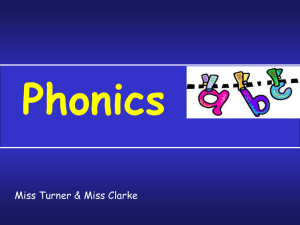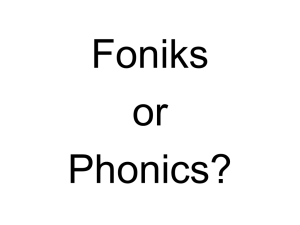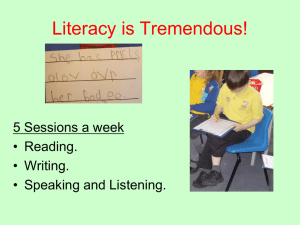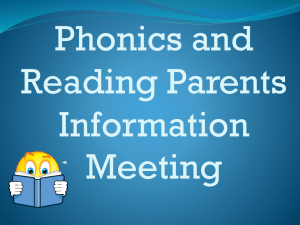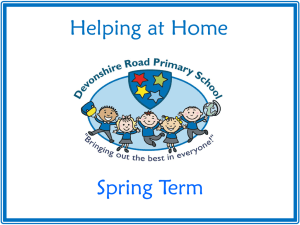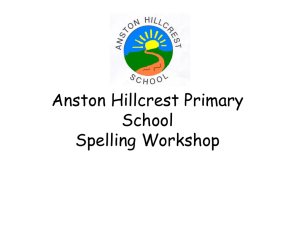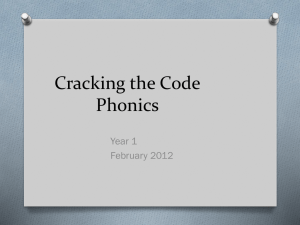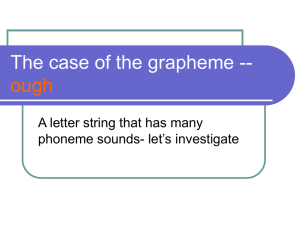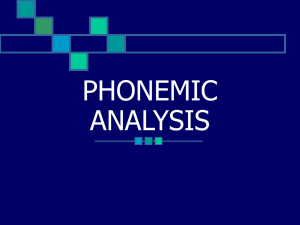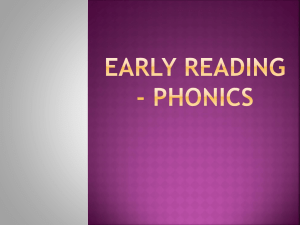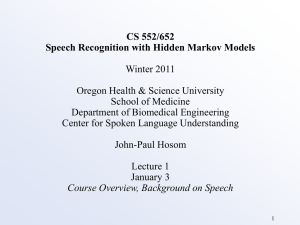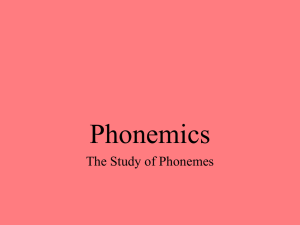Document
advertisement
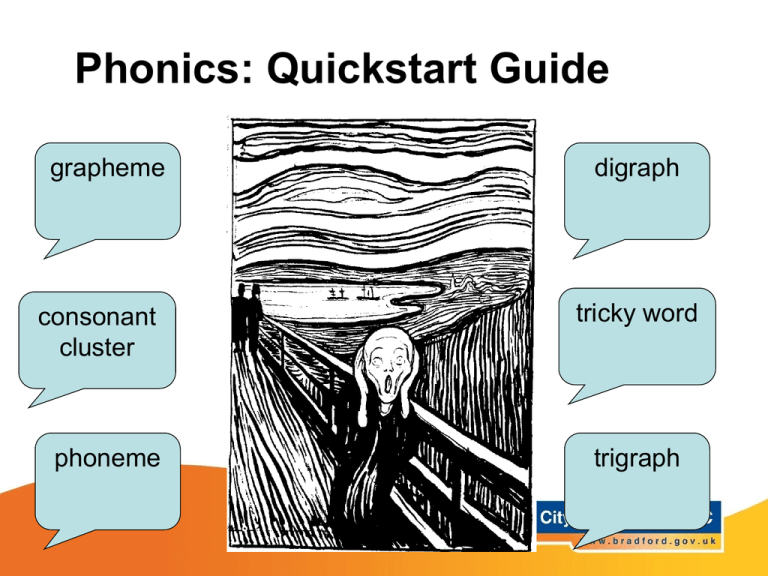
Phonics: Quickstart Guide grapheme consonant cluster phoneme digraph tricky word trigraph Essential phonics knowledge • • • • • Adults need to: know what graphemes are know what phonemes are How graphemes match with phonemes Know that graphemes should be sounded, in order, from left to right and the phonemes then blended all through the word for reading Phase 2 •Letter progression: •Set 1: s, a, t, p •Set 2: i, n, m, d •Set 3: g, o, c, k Phase 2 • Set 4: ck, e, u, r • Set 5: h, b, f, ff, l, ll, ss What is a phoneme? • Smallest unit of sound in a word • Approximately 44 phonemes in English What is a grapheme? Letters which represent phonemes are known as graphemes 3 big things about phonics A phoneme can be represented by one or more letters: p sh ee ear 3 big things about phonics The same phoneme can be represented / spelled in more than one way: ai ay a-e 3 big things about phonics The same spelling can represent more than one sound: ear bear What is a digraph? Digraph: Two letters, which make one sound. ck ff sh ch ea ie ir oy What is a split digraph? • A digraph in which the two letters are not adjacent – e.g. cake, hope, cube cake Enunciation • Teaching phonics requires a technical skill in enunciation • Phonemes should be articulated clearly and precisely Go to YouTube Search for Articulation of Phonemes http://www.youtube.com/watch?v=BqhXUW_v-1s Go to YouTube Search for Mr Thorne Enunciation a ai oo oi Vowel Phonemes e i o ee igh oa ar or ur air ear er u oo ow Enunciation b h p v sh Consonant Phonemes c d f j l m qu r s w x y ch th th g n t z ng How many phonemes? Phoneme Count witch cat up edge wing wanted Answers to Phoneme Count witch cat up edge wing wanted Sound Buttons c a tch c r u tch Phoneme Frame p s i t tch i tch Consonant Clusters black felt strong blank Where there are two or more consonants next to each other these are called clusters (ng is not a cluster but one phoneme) dw ng br sh ck tch cl st gl scr Digraph/Trigraph Clusters dw br ng sh st cl ck tch gl scr Phase 3 - High Frequency Words Decodable Words will see that for this now then down them look with too Tricky Words he you she they we all me are be my was her Blending ‘Blending’ means merging the individual phonemes in order to pronounce a word. In order to read an unfamiliar word, a child must recognise [ 'sound out’] each grapheme, not letter, and then merge the phonemes together to make a word. Using your blending skills As you read this word concentrate on the skills of breaking the word into chunks, identifying the graphemes and then merging the individual sounds together bleepippitousness Coaching for blending • Model the correct process • Break the word down into smaller chunks e.g. blend two sounds and then add a third or blend three and add a fourth • Reinforce grapheme correspondences so that children recognise them when they see them in words e.g. ai in train Segmenting Segmenting means identifying the individual sounds in a spoken word [e.g. c-r-a-sh] and writing down or manipulating letters for each sound to form the word. In order to spell the word, a child must segment it into its component phonemes and choose a grapheme to represent each phoneme. Using your segmenting skills When you write the following word, concentrate on identifying the individual phonemes in the word and then allotting a grapheme to each phoneme to write the whole word. Coaching for segmenting • Model the correct process • Give auditory prompts • Say the word slowly focusing on writing one grapheme at a time • Child must check own word and modify it • Reinforce grapheme correspondences so that children can reproduce them quickly when they are writing Tricky word tricky word – digraph – trigraph – consonant cluster digraph Essential phonics knowledge • • • • • Do you?: know what graphemes are know what phonemes are How graphemes match with phonemes Know that graphemes should be sounded, in order, from left to right and the phonemes then blended all through the word for reading Idea Phase 2 RR Swapshop PT A Phase 2 RR PT A Phase4 RR PT A Phase 5 RR PT A Phase 6 RR PT A Flash cards igh dge oo tch ar Sound Buttons c a tch c r u tch Phoneme Frame p s i t tch i tch Quickwrite And then… Phonics Family Fortunes igh Phase 3/4 night sight light Connect 4 Connect 3 – Phase 4 green trap spoon trip CCVC CCVCC stamp grip tree crunch spin star crisp grab trip spoil trust stop http://www.classtools.net/education-games-php/fruit_machine Connect 3 – Spelling accommodate accompany according apparent appreciate attached aggressive committee communicate community embarrass exaggerate Word list Y5/6 Menu – Flash cards – Phoneme frame – Quickwrite – Sound buttons – Envelope – Family Fortunes – Connect 4 More ICT resources . . . Pocket Phonics Phoneme pop http://www.ictgames.com/phonemeFlop_v4.html Forest phonics Quick phonics based spelling test • The assessment is carried out as a traditional spelling test • When the test is complete highlight the errors on each sheet • Group the test papers together so that children with similar needs can be identified Individual test sheet with errors highlighted Children’s names go here Class record sheet: Green = correct Pink = incorrect Read the grid vertically to show individual errors. Read horizontally to identify common errors to aid planning • The test identifies children’s errors in spelling • If children show a lot of errors, it might be worth identifying whether they are able to read the words When phonics becomes spelling Phase 6 • Children are taught: – Word specific spellings eg. see/sea, bed/head/said – To become increasingly fluent in the sounding and blending of words when reading – To read and spell words with prefixes and suffixes, doubling and dropping letters when necessary – To become increasingly accurate when spelling words containing unusual GPCs e.g. laugh, once, answer The 4-part lesson – 20 minutes Revise - briefly practice what was taught yesterday Teach - new GPC or blending or segmenting skills Practise – what you just taught ! Apply - link the skill taught to reading or writing Make sure all children are engaged Suggested sequence for teaching spelling Revise, explain, use Teach, model, define Practise, explore, investigate Apply, assess, reflect Flash Spelling • A daily activity to support focused spelling – Write up a word on the board – Discuss • Meaning • Easy bits • Tricky bits – Suggest ‘fixing’ strategies Flash Spelling – – – – – accommodate Look at the word for 10 seconds and say it Close your eyes and picture the word Write the word with your finger on the table Write on a whiteboard SHOW ME! embarrassed • Remember to discuss strategies that will help children to remember spellings cemetery Clear the board • A game for two players – High frequency words – Personal spellings • You will need: – Game board – A dice – A list of six spellings per player Clear the board Player 1………………. 1 2 Player 2………………. 3 4 5 6 Clear the board 1. Write six spellings for each player on the game board 2. The first player throws the dice, reads the number and looks at the word opposite the number 3. Using LCWSC the player tries to spell the word which the other player covers – if correct the word is crossed out – if not, it stays on the board 4. Player 2 takes their turn 5. If a blank space is hit because the word has already been removed, the player misses a turn The first to remove all of their words wins Player 1………………. accommodate gauging symmetry cobbler harassed ankle 1 2 3 4 5 6 ecstasy. cemetery pedlar Player 2………………. embarrassed unparalleled lady's Player 1………………. badge bridge huge change gem jacket 1 2 3 4 5 6 edge dodge age charge giant adjust Player 2………………. Now you see me… 1. Two children sit opposite each other with a pile of spelling cards between them – each has a whiteboard or pen and paper. 2. Player 1 picks up a card and reads the word aloud without showing it to the other player and then places it face down on the table. 3. Both players write the word. 4. They turn over the card and check their spellings. 5. If player 1 (who saw the word is correct s/he scores 1 point. If player 2 (who didn’t see it) is correct they score 2 points. 6. The game continues … Now you see me … Score Board Player 1 Word Player 2 Points Word Points Look, say, cover, write, check Look bridge b Say Cover Write bridge Check bridge bridge r i d g b r i dge e
